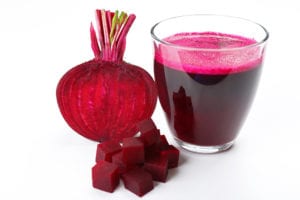Written by Halima Phelps, Staff Writer. A group of trained soccer players participated in a study consuming nitrate-rich beetroot juice supplementation and experienced significant improvements in endurance, lowered heart rates, and better oxygen utilization than placebo.
 Nitric oxide is a biological substance with implications in various areas of the body including the vascular and immunological systems.² In the past, nitrite and nitrate, byproducts of nitric oxide metabolism, were believed to be chemically inactive substances. ¹. However, it has been recently discovered that nitrate may benefit athletes looking to increase athletic performance. Previous research has demonstrated the efficacy of dietary nitrate consumption on improving the utilization of biologically-available oxygen in athletes, and subsequently increasing their athletic performance.³ However, the research was performed for endurance exercise, and used large dosages.
Nitric oxide is a biological substance with implications in various areas of the body including the vascular and immunological systems.² In the past, nitrite and nitrate, byproducts of nitric oxide metabolism, were believed to be chemically inactive substances. ¹. However, it has been recently discovered that nitrate may benefit athletes looking to increase athletic performance. Previous research has demonstrated the efficacy of dietary nitrate consumption on improving the utilization of biologically-available oxygen in athletes, and subsequently increasing their athletic performance.³ However, the research was performed for endurance exercise, and used large dosages.
Therefore, further research was needed to support plausible evidence that nitrate supplementation could enhance performance in high-intensity and/or intermittent type exercises, and also with using a lesser daily dosage to better mimic normal daily supplementation amounts. In a double-blind randomized, placebo-controlled cross-over study, researchers tested whether 6 days of nitrate ingestion could further substantiate these findings in trained soccer players.
For this study, thirty-two male soccer players (age: 23 ± 1years, height: 184 ± 1m, weight 77 ± 1kg, playing experience: 15.2 ± 0.5 years, playing in the first team of a 2nd or 3rd Dutch amateur league club) were given a 140 mL (12.9 mmol) portion per day of either nitrate-rich beetroot juice (BR) or nitrate-depleted placebo beetroot juice (PLA). There were two six-day supplementation periods with a minimum eight days of washout in-between. At the end of each 6-day period, and approximately 2h after taking the final 140 mL supplementation of beetroot juice, plasma and saliva samples were gathered from each participant. To examine the results of nitrate supplementation, the Yo-Yo Intermittent Recovery test level 1 (Yo-Yo IR1), a measurement tool used to assess physical performance in soccer players, was used to test physical endurance of participants. A heart rate monitor was also utilized during the Yo-Yo IR1 to detect average and peak heart rates.
Test results showed evidence that supplementation with BR in comparison to PLA over the six day trial period significantly increased plasma nitrate (632 + 66 nM vs.186 + 13 nM; p < 0.001; and saliva (2882 ± 519 µM vs. 375 ± 54 µM; p < 0.001). There was also a significant enhancement of high-intensity intermittent running performance with BR vs. PLA supplementation. The Yo-Yo IR1 test showed that BR supplementation significantly increased running distance performance by 3.40 ± 1.3% (from 1574 + 47 to 1623 + 48 m; p=0.027).
Although the peak heart rate showed no enhancement from BR, the average pulse rate improved in BR vs. PLA supplementation, showing a decrease in mean heart rate with BR supplementation. The average pulse rate in BR users was (172 ± 2), whereas with PLA users it was (175 ± 2; p= 0.014).
In conclusion, the results were favorable in supporting the test hypothesis that supplementation of nitrate from BR for a six day period does enhance athletic performance in high-intensity and/or intermittent type exercises.
Source: Nyakayiru J, Jonvik K, Trommelen J et al. Beetroot Juice Supplementation Improves High-Intensity Intermittent Type Exercise Performance in Trained Soccer Players. Nutrients. 2017; 9(3):314. Doi: 10.3390/nu9030314.
© 2017 by the authors. Licensee MDPI, Basel, Switzerland. This article is an open access article distributed under the terms and conditions of the Creative Commons Attribution (CC BY) license (http://creativecommons.org/licenses/by/4.0/)
Click here to read the full text study.
Posted May 11, 2018.
References:
- Lundberg J, Weitzberg E, Gladwin M. Nature Reviews Drug Discovery. 2018. Available at: http://www.ym.edu.tw/bps/paper/0514%20the%20nitrate.pdf. Accessed April 26, 2018.
- Wu A, Duan T, Tang D et al. Determination of Nitric Oxide-Derived Nitrite and Nitrate in Biological Samples by HPLC Coupled to Nitrite Oxidation. Chromatographia. 2013;76(23-24):1649-1655. doi:10.1007/s10337-013-2529-0.
- Nyakayiru J, Jonvik K, Trommelen J et al. Beetroot Juice Supplementation Improves High-Intensity Intermittent Type Exercise Performance in Trained Soccer Players. Nutrients. 2017;9(3):314. doi:10.3390/nu9030314.
- Kohn TA e. Specific muscle adaptations in type II fibers after high-intensity interval training of well-trained runners. – PubMed – NCBI. Ncbinlmnihgov. 2018. Available at: https://www.ncbi.nlm.nih.gov/pubmed/20492589. Accessed April 27, 2018.

